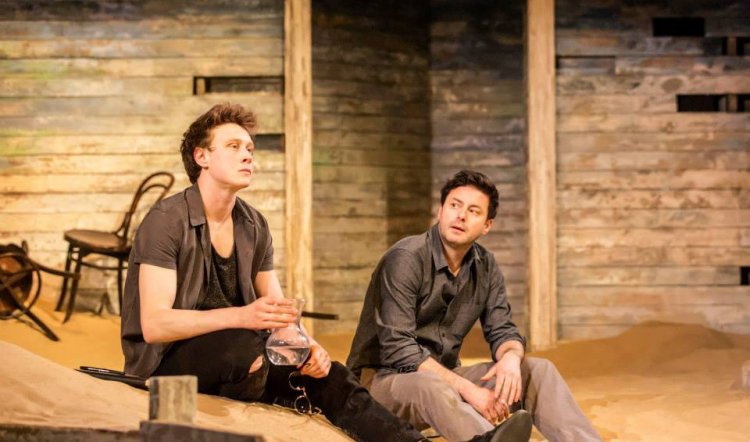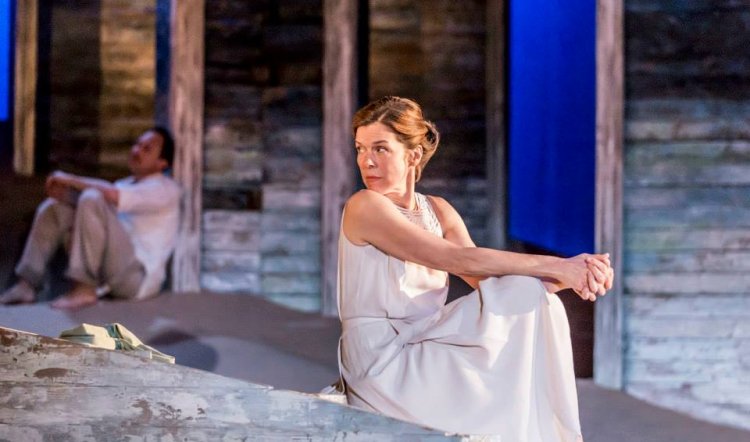
AH, WILDERNESS!
AH, WILDERNESS! Young Vic, 14 April-23 May 2015. Photography by Johan Persson: above: George MacKay and Dominic Rowan; right: David Annen and Janie Dee.
Eugene O’Neill wrote only one play that could (and has been) described as a comedy and after sitting through the very long 110 minutes of Ah, Wilderness! one can see why he stuck to tragedy and melodrama. Written in 1933, some seven years before Long Day’s Journey Into Night, the play for which it’s apparently a prequel, it’s also set in the summer clapboard cottage on the Connecticut seashore of the playwright’s boyhood memory, on which he wistfully looks back.
How do you we know he’s wistfully looking back? Director Natalie Abrahami has added an O’Neill look-alike (David Annen) who alternates looking wistful with scribbling in a notebook and vaguely taking part at various points. His participation becomes momentarily central in the second half when he is required to carefully sweep the downstage area clear of sand in order that a pond may be filled with water. Watching an actor spend many minutes diligently wielding a broom is one of the less interesting ways of passing time, and this bit of housework acting is no exception.
It’s not that there is much else to excite the viewer, however, although the periodic letting off of fire crackers at least keeps the unwary leaping out of their skin. The play is set on Independence Day, 1906 – the Fourth of July – and the Miller family will experience all the highs and lows of the traditional celebration. Uncle Sid (Dominic Rowan) will get amiably drunk, mother Essie (Janie Dee) will fret about them all turning up on time for her marathon-cooking session family dinner; and the two sons will do their boys-to-men thing (Ashley Zhangazha as Arthur and George MacKay as Richard).
David Annen is also father of Muriel (Georgia Bourke) the girl destined to be Richard’s first love. And, after she’s dumped him at dad’s behest, Annen is also the barman who slips him the illicit booze that will give him the courage to chat up a brassy young tart (Yasmin Paige). Curious casting that could have been sort of interesting if more attention had been paid to the text and performances and less to the ridiculously overwhelming set.
Designer Dick Bird is quoted in the program notes as having been inspired by the shifting sand dunes of Namibia and the way they have partially engulfed and ruined abandoned buildings. So, his interpretation of the Connecticut holiday house is a series of terraced levels beginning with the ruins of a clapboard house through which a pleasant blue sky can be seen, down what once may have been a garden but which is now a perilous-for-actors series of partially buried steps to a flat area which inexplicably and absurdly becomes a pond for the last 15 minutes. (Cue symbolic paddling then total immersion by the young author.)

Aside from doing nothing to enhance or illuminate the play but rather the reverse, the set must have cost a fortune (construction Miraculous Engineering Ltd); looks like hell to work on (all cast members will have scabs and scrapes and great calf muscles by the end of the run); must also be a bitch to dress after each performance (stage manager Maris Sharp, deputy stage manager Sophie Rubinstein, assistant stage manager Emma Ryan, stage management work placement Lina Hallem). And – as you may have worked out – is a complete and ongoing distraction from the play itself which isn’t that robust in the first place.
The production isn’t that robust either, possibly because so much time and energy had to be given to the set and negotiating it, or possibly because the cast is a patchy bunch much given to bellowing or shrieking for no apparent reason. Janie Dee shines as the snippy mother and George MacKay is clearly on the way to stardom, although he really should learn volume control before hubris sets in.
The full house at the Young Vic seemed to enjoy it although applause was polite rather than passionate. In the end, however, one was left with the thought that there are most often really good reasons why a play is “neglected” or “rarely performed”.



